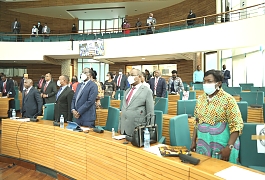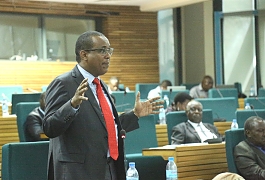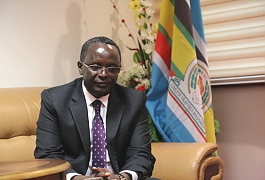Regional legislators are calling on Partner States to give more prominence to youth entrepreneurship and sustain awareness on employment opportunities, as means to combating youth unemployment and under-employment in the region.
This sums up recommendations of a two day workshop on “Formulating Strategies to Combat Youth Unemployment” organized by the East African Legislative Assembly (EALA) held in Kigali, Rwanda.
The workshop which ended today was opened by the Rwanda Minister for Youth Affairs, Hon Mitali Kabanda Protais. In his remarks, the Minister reiterated the need for sustained efforts in enabling youth to be self reliant and job creators.
He termed limited opportunities for formal sector employment, the desire by employers to look for experience in adult workers hence locking out cadres of youth workers and the lack of information on requisite skills as factors resulting in youth underemployment and unemployment.
Hon Mitali said cottage industries were vital in harnessing employment within the communities and encouraged the need for increased linkages with Micro-Finance Institutions (MFIs) for loans.
The Minister added that youth needed meaningful employment in order to build stable and sustainable communities. Young people, when gainfully employed, represent a tremendous resource for the holistic development of the country; they bring energy, creativity, and imagination to many nation-building tasks, the Minister added.
He said peace and security was vital in the creation of opportunities for the youth.
“Poverty is a route for conflict and instability thus peace and security should be considered within the context of economic development. Unemployment is a constant issue among youth resulting in urban migration, social unrest and alienation”, Hon Mitali noted.
The Chairperson of the EALA Committee on General Purposes, Hon Sebtuu Nassor, said EALA had taken on the youth agenda seriously and had last year, initiated efforts towards mainstreaming the issue of youth in existing policies and sensitization programmes.
Hon Nassor noted that Partner States had undertaken to co-operate in the Social Welfare arena with respect to the adoption of a common approach to the marginalized groups as provided for under Article 120 of the Treaty for the Establishment of the East African Community.
The EAC Presentation titled “Opportunities, Prospects and Challenges for the Youth in relation to Labour, Skills and Employment in the Context of the EAC Common Market Protocol and Integration Process” was made by the EAC Principal Gender and Community Development Officer, Ms. Perpetue Miganda. She noted EAC had put together a draft Social Development Framework tackling a number of issues affecting the youth.
.
”While youth unemployment results in significant losses to economies of the Partner States, the greatest damages are to the self-esteem and general well-being of young people as they find themselves socially excluded, vulnerable, frustrated and idle- a mix of feelings that can pre-dispose them to engage in a range of risk behaviour such as organised crime”, she said.
The key principles in addressing outstanding challenges will include ensuring full enjoyment by young people of all human rights and fundamental freedoms including migration and labour mobility rights.
Ms. Miganda noted some of the achievements so far at the EAC as the establishment of a Sectoral Council on Gender, Youth, Children, Social Protection and Community Development and the adoption of the Regional Decent Work Programme by the Ministers of Labour in EAC. The Regional Decent Work Programme which covers the period 2009 to 2015 prioritizes youth employment and builds on the youth employment interventions in the decent work country programmes.
Country presentations from the Partner States at the workshop depicted high youth unemployment, rapidly growing labour force, under-employment, problem of the working poor and gender inequality in employment as some of the challenges.
In his presentation, the Executive Secretary of the East African Trade Union Confederation (EATUC), Mr. Emanuel Nzunda called on EAC Partner States to empower youth with disabilities and youth living in difficult circumstances to foster and increase their employability and motivate employers to employ them. He noted such a move would foster equal opportunities. The EATUC Executive Secretary noted that private sector development remained critical in addressing youth employment since the sector provides for main long-term sources of jobs and incomes.
The Partner States were urged to take responsibility in investing in education and vocational training for young people and to improve the impact of the investments.
The issue of entrepreneurship, delegates recommended, was necessary and vital. Partner States were urged to take ownership of the youth entrepreneurship development programmes, if they are to be sustainable in the long-run.
The need for creation of decent jobs through government support to the informal sector (policy and fiscal tools) was highlighted as fundamental with participants noting that employment was key to economic and social development. It was stated that providing young people with job opportunities was a major issue for all countries, irrespective of their levels of development.
In that regard, partner States were urged to integrate the uneducated unemployed youth into the labour market through apprenticeship programmes, agriculture and the construction industry among others.
On legislation, reforms at national level and at EAC should be emphasized in order to have legislation oriented towards job-creation. This should be backed by having the rightful policies in place.
END
For More Information, contact: Bobi Odiko, Senior Public Relations Officer; East African Legislative Assembly; Tel: +255-27-2508240 Cell: +255 787 870945, +254-733-718036; Email: bodiko@eachq.org Web: https://www.eala.org Arusha, Tanzania.



